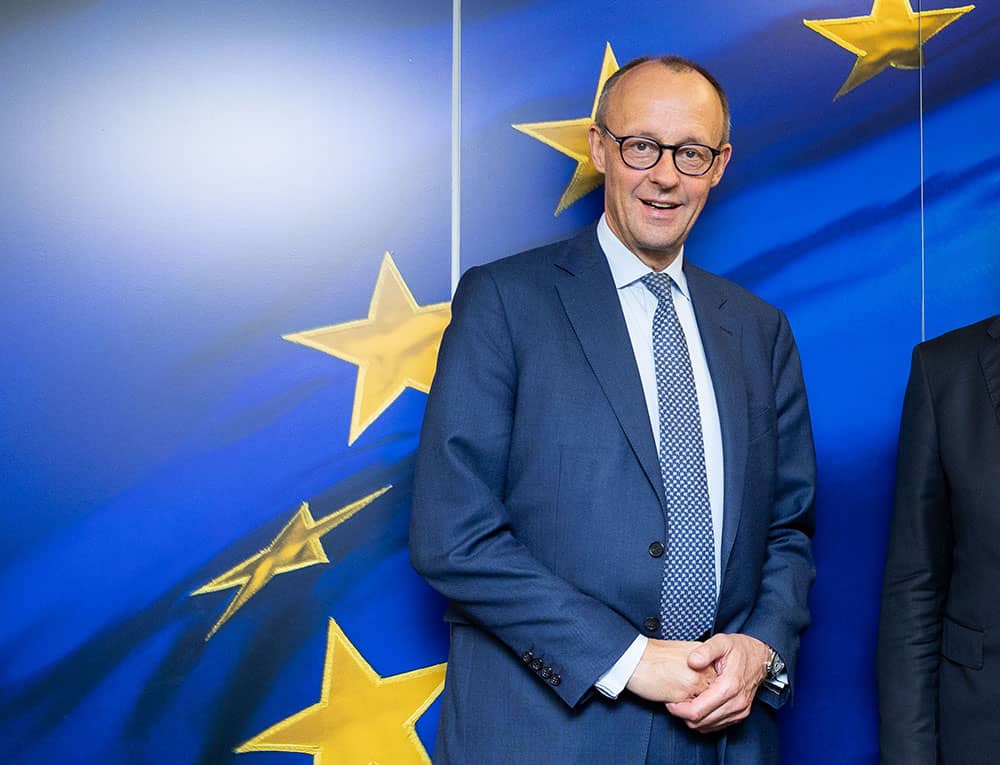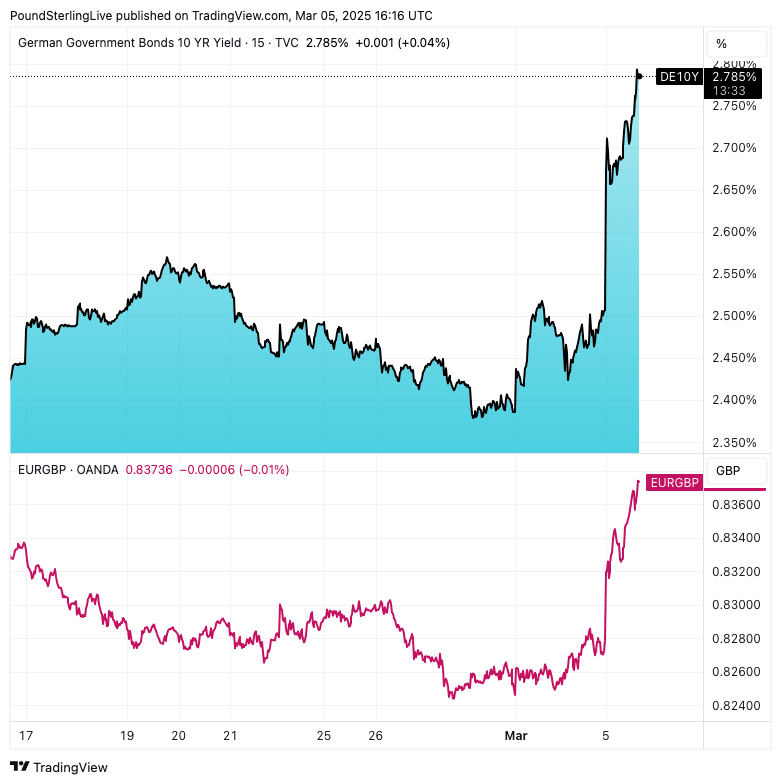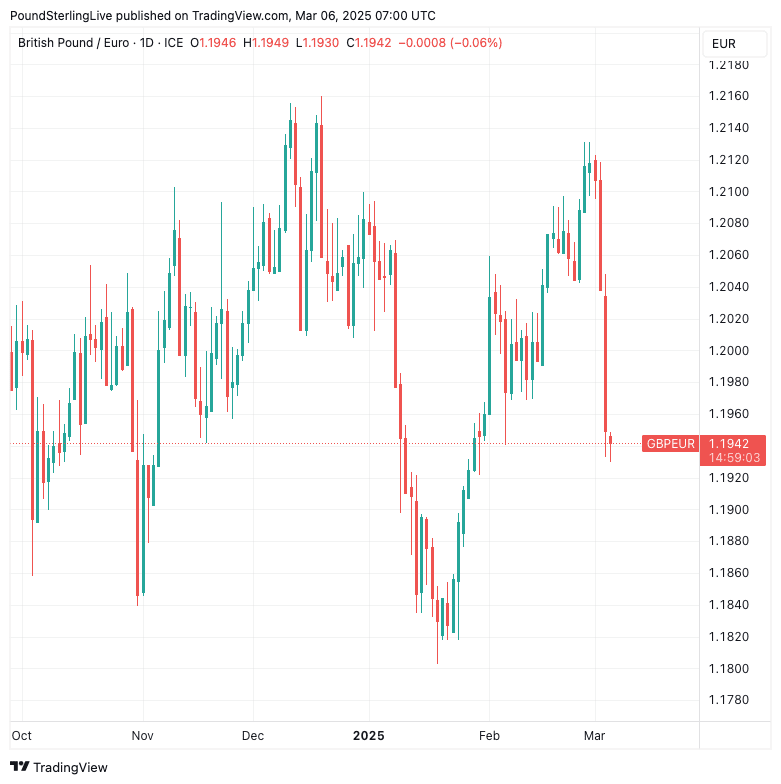
File image of Friedrich Merz. Photographer: Jennifer Jacquemart, Source: EC - Audiovisual Service.
Germany's 'whatever it takes' moment equals a higher euro, say analysts.
The Pound-to-Euro exchange rate (GBP/EUR) on Thursday tests its lowest level since January at 1.1937 after investors Germany's multi-billion commitment to boost infrastructure and defence spending.
Germany plans to alter the constitution to allow it to borrow billions of euros to fund the measures, which has sent German 10-year bond yields - a key measure of debt costs - tearing higher.
"In view of the threats to our freedom and peace on our continent," incoming Chancellor Friedrich Merz said Tuesday evening in Berlin, the motto "whatever it takes" must now apply to the country's defence.
Above: Surging German bond yields suck up the EUR/GBP ( = lower GBP/EUR).
Surging bond yields are boosting euro exchange rates as global investors snap up the underlying bonds to take advantage of the better returns they offer.
This creates strong capital flows into the single currency, ensuring GBP/EUR endured its biggest single daily loss in five months on Wednesday, tallying this week's decline to 1.55%.
"On the back of news from Germany, we have seen European bond yields surge higher," says Fawad Razaqzada, Market Analyst at City Index. "The euro has rallied across the board, with the EUR/USD climbing to 1.0770. The single currency has also gained ground against most other major currencies, including the pound, franc and yen."
"GBP/EUR has dropped 1.5% this week after enduring its biggest single day loss in five months as stronger flows into the euro dominate," says George Vessey, Lead FX Strategist at Convera.
Economists, analysts and politicians have long argued that Germany's ironclad commitment to keeping debt under control was acting as a brake on economic expansion and dynamism, particularly when the economy is struggling and desperately needs to borrow to invest.
The proposed measures, agreed upon by the conservative CDU/CSU bloc and the Social Democrats (SPD), who form the current government and will form the next one, include allowing defense spending exceeding 1% of GDP to be exempt from the debt brake constraints.
The changes will also allow for the creation of a €500BN infrastructure fund to revitalise the economy and modernise critical infrastructure. This initiative seeks to address economic stagnation and prepare Germany for future growth.
Surging European defence stocks have meanwhile driven Euro equity market outperformance relative to the U.S. in 2025, and alongside the rising yields, this makes the euro an attractive prospect.

Photographer: Nicolas Kovarik. Image copyright European Union, Source: EC - Audiovisual Service.
These reforms represent a notable shift in Germany's fiscal policy, reflecting a move away from stringent austerity measures towards increased investment, that analysts say will boost the Euro and other European assets.
The announcement from the incoming German government leaders on an unprecedented three-pronged fiscal package "has the potential to substantially alter the outlook for German growth, and in turn has significant implications for European FX markets," says Goldman Sachs.
Davide Oneglia, an economist at TS Lombard, says the changes mean Germany will spend at least 2% of GDP/year on infrastructure and defence over the next 10 years.
Because of a secular public capex dearth and cyclical industrial weakness, the money will have a strong multiplier effect, meaning it will offer a boost to other sectors of the economy, says TS Lombard.
This can revive business sentiment not only in Germany but across the EU as other economies benefit from supply chain exposure.
"Europe is escaping its liquidity trap, its animal spirits are coming out of hibernation, and European investors are increasingly willing to buy European risky assets," says Mathieu Savary, Chief European Strategist at BCA Research. "Europe will come out roaring of this period of uncertainty."
For markets, TS Lombard thinks this means it will pressure the ECB to slow down its rate-cutting cycle.
This will lead to a "stronger euro," says Oneglia.
Above: GBPEUR at daily intervals.
Savary explains that fiscal austerity is out of favour. "Austerity had unnecessarily burdened Europe and exacerbated the private sector’s deleveraging."
He thinks the German decision, alongside notable changes announced by the European Commission to boost investment in rearmament, will awaken dormant 'animal spirits' in Europe.
Savary says to buy euros on weakness.
Strategists at Bank of America are also buyers of the Euro as Germany reaches a "watershed moment" that will prove a "game changer".
Now is the time for "bullish EUR trades," says Athanasios Vamvakidis, FX Strategist at Bank of America.
Also turning on the fiscal taps is the European Union, which is readying to tap markets for up to €150BN to help finance military spending.
The European Commission will borrow the money by issuing special bonds and then make the proceeds available to European capitals to boost their armed forces, who would then pay the money back.
The advantage of issuing debt at the EU level is that the debt has an outstanding credit rating and interest rates are notably lower, allowing EU countries to borrow at much lower rates than would be the case if they individually issued debt.


